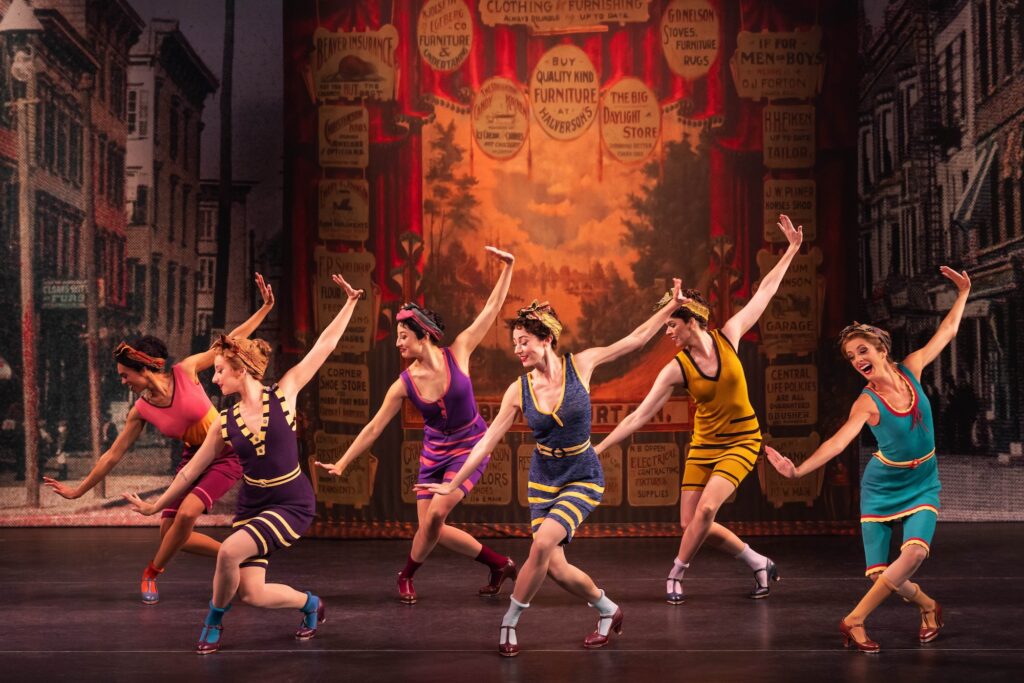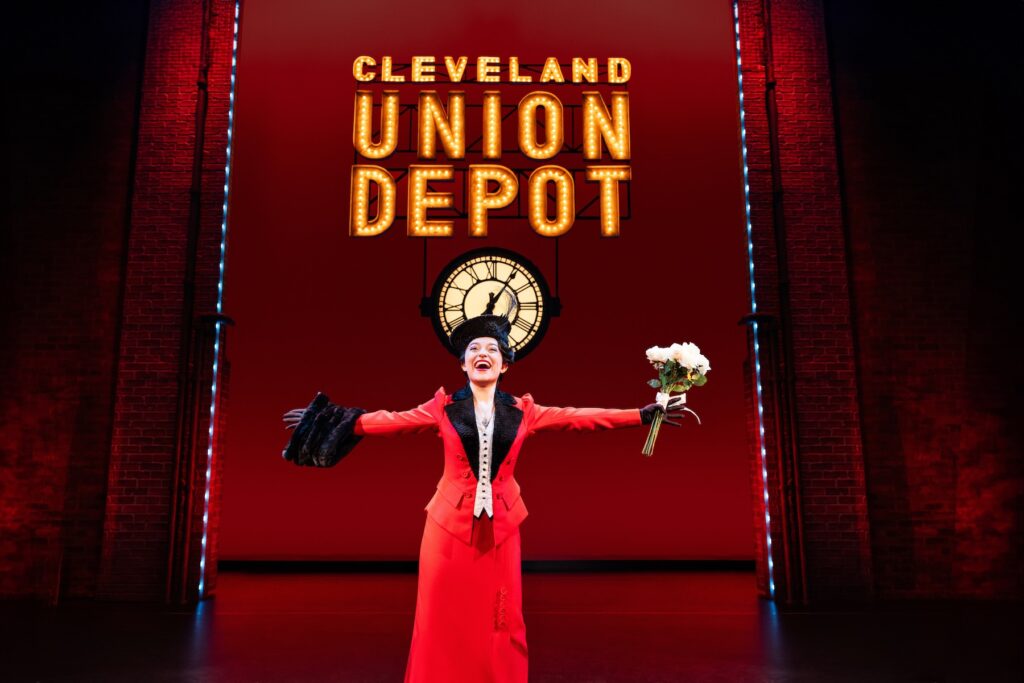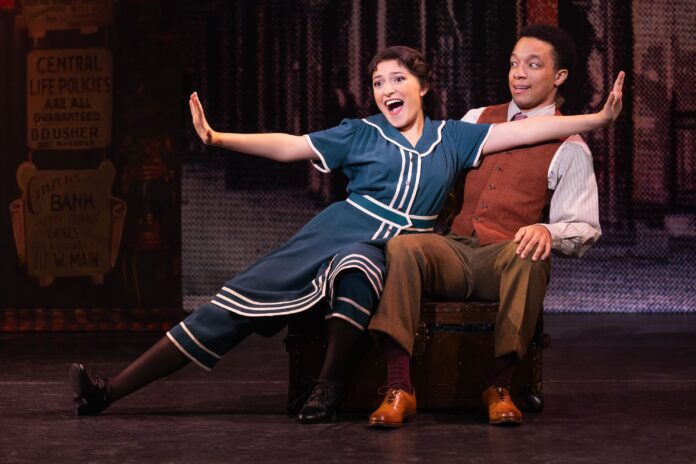It’s hard to think of another famous stage musical that’s remained more inextricably bound to one performer than Funny Girl (North American tour through May 26 at Orpheum Theater, SF via BroadwaySF). It has endured in popular culture and amateur productions, yet with a dearth of major revivals—not until the last decade, when the show was over 50 years old. (It’s now hit 60.) The obvious reason is that Barbra Streisand still owns it; the show made her a stage star, then a movie star. The songs have been covered by many others, yet somehow they remain “hers.” It may ostensibly be a musical about legend Fanny Brice, a performer largely lost to time because her chosen media (stage revues, radio comedy) are now more or less extinct. But from the start, the show became so completely stamped by La Streisand’s persona that to many, that showbiz-bio angle seemed a mere pretext for myth-making on behalf of its own star performer.
Nobody wants to step into those kinds of shoes. And indeed it did not seem a very good idea for Beanie Feldstein to do so in the first-ever Broadway revival two years ago. (A couple better-received attempts with other players had previously been made on the West End and elsewhere.) She was apparently funny enough, but lack of sufficient vocal chops and other qualities need to punch across this challenging role won her some pretty scathing reviews—all very much shadowed by the clucking invisible presence of you-know-who. But that perceived failure was salvaged when Lea Michele took over the part a few months later, lending the revival “legs,” as they say. So now we’ve got Katerina McCrimmon in the touring version, which opened at the Orpheum downtown last Thursday night.
If that name doesn’t ring a bell, you’re not alone; McCrimmon hasn’t much of a track record, purportedly “discovered” by Marisa Tomei, playing just a few professional roles to date. Of course, since Funny Girl is largely about a star being born (ahem), having a relative newcomer in the role is apt. She passes with flying colors the steepest demand here: Equipped with a very pure and supple instrument, she makes the songs her own, even (or especially) the inescapable “People”—despite starting that out so softly it’s almost inaudible. Jule Styne and Bob Merrill’s durable score holds up very nicely through a performer whose interpretations are so technically refined, you almost don’t miss the stamp of overpowering individuality.
But that’s also the problem here, with or without the hovering specter of Babs: McCrimmon is a very good singer and a proficient actress, but not a personality. Funny Girl does need the latter, not least because it keeps insisting Brice is so singular, as indeed that comedienne-222vocalist was. This actress labors with the admittedly creaky comedic shtick. She’s conventionally pretty enough to undermine all the emphasis on how pretty Fanny isn’t. (The staging tries to compensate by casting very tall Ziegfield “girls,” amongst whom this star looks stunted.) Our heroine is meant to be a plucky, needy underdog with a soft center, but McCrimmon lacks vulnerability—instead she makes Brice seem furiously driven, then neurotic in success, then just angry. That attitude helps to sock across little-engine-that-can numbers like “Don’t Rain On My Parade.” But it doesn’t do much for the romance that is granted greater focus here than in the film.

A more serious criminal in real life than the unlucky gambler and businessman he’s painted as in this highly fictionalized portrait, Nicky Arnstein has always been something of a thankless role. The sheer force of Streisand’s pining onscreen both flattered passive Omar Sharif and rendered him near-redundant. Stephen Mark Lucas is tall, dark and handsome in an almost parodic way, like Lyle Waggoner; he’s unexpectedly amusing when allowed to have fun with the awkward seduction of “You Are Woman, I Am Man.” But his Nicky is so cardboard and callow, we can’t really root for this love story. She seems smitten solely with his looks, and he regards her with the polite good humor of an uncle watching a child do somersaults. Later, we’re meant to see him as a tragic figure, but the depth required for that hasn’t been remotely tapped. Lucas’ mile-wide vibrato and wavering pitch are also problematic at times.
Score aside, Funny Girl has seldom been considered a truly great musical, mostly because of Isobel Lennart’s original book. Harvey Fierstein’s revision is surely an improvement, one borne out by the lively, brisk pace of Michael Mayer’s production. Still, he’s stuck with dated and clunky elements that can’t be vanished, because they’re key to the vaudevillian Borscht Belt construct known as Fanny Brice. (Needless to say, ’70s pop icon Melissa Manchester doubles down as the fountain’s source, Mamma Brice.) That material already felt hokey when the musical premiered in 1964, more so in 1968 when the film came out… which didn’t stop it from being that year’s box-office champion, besting even 2001.

The movie eliminated numerous songs, replacing some with new Styne-Merrick originals, adding a couple standards from Brice or Streisand’s stage repertoire. Most of those dropped were the vestiges of Broadway Funny Girl’s attempts to not be entirely a star vehicle—and to give its star an occasional breather. None are highlights, but do diversify the package. They allow secondary male lead Eddie (Iziah Montaque Harris) some tap dances, mamma’s neighborhood cronies (Eileen T’Kaye, Cindy Chang) a Greek-chorus function, and glimpses of the entertainment which would have occupied a Ziegfield Folly or other revue when Fanny wasn’t doing her “specialties.”
This is not a dance-heavy show, but choreographer Ellenore Scott makes the most of her opportunities, as does costume designer Susan Hilferty—and in both cases, the best of those opportunities lie in the well-drilled corps of Ziegfield chorines. David Zinn’s set design is more expedient than striking (let alone lavish), forfeiting most of the show’s visual excitement to Hilferty.
Fanny Brice did not become a movie star, nor live long enough to make an imprint on television. So for better or worse, her legacy has largely been reduced to the heavily romanticized Funny Girl, in which the actual romance isn’t even the good part. (Strangely, no one seems to remember the poorly reviewed screen sequel Funny Lady—yet it was one of the biggest hits of 1975.) This enjoyable revival makes a case for the musical’s strengths, even as it can’t quite cover its weaknesses. The general effect is sturdy enough to provide a colorful, tuneful, old-fashioned night of big emotions and broad comedy. It’s nobody’s fault that it lacks a phenomenon at the center… or that phenomena are pretty hard to come by, as ever.
FUNNY GIRL plays through May 26 at the Orpheum Theatre, SF. Tickets and more info here.







